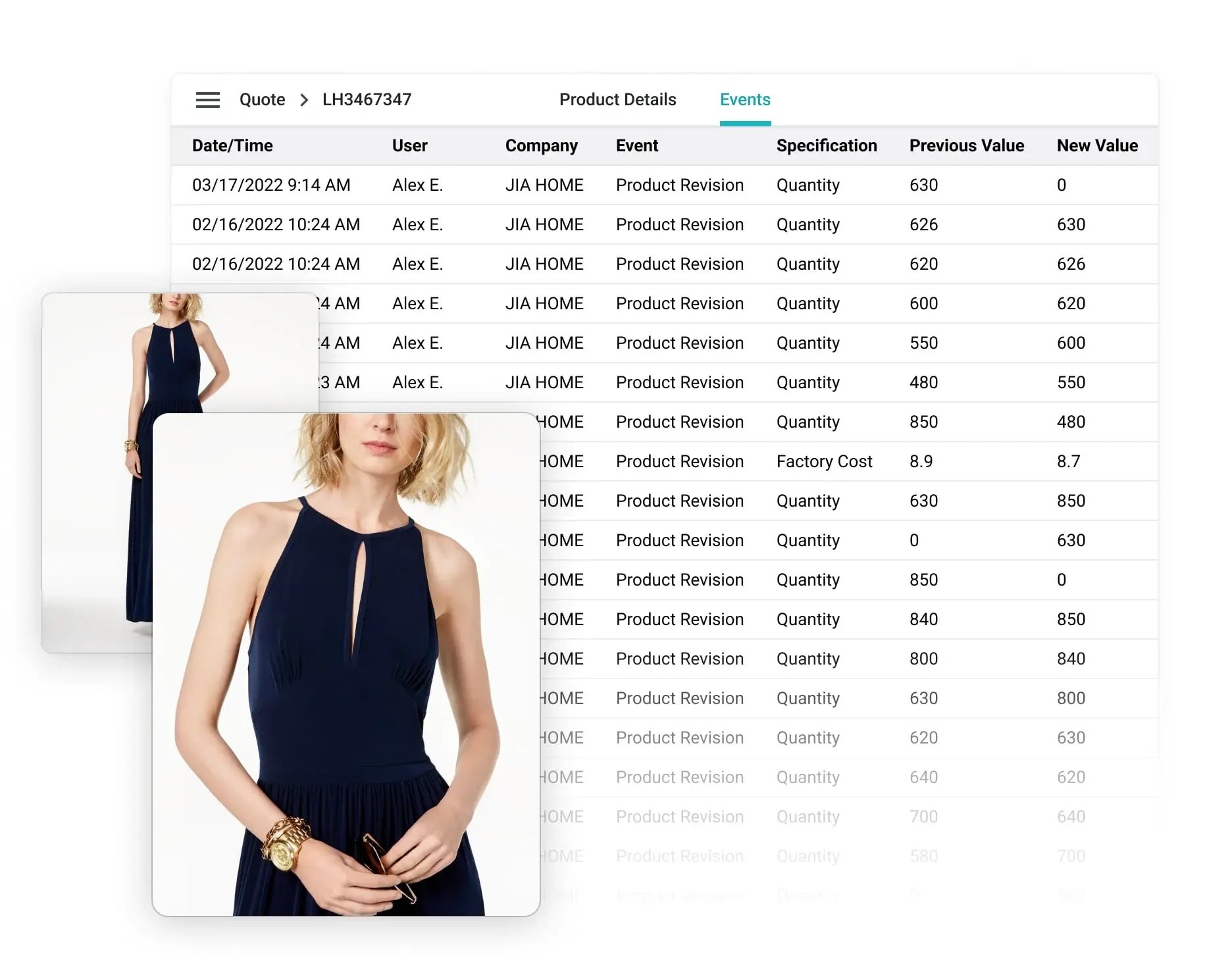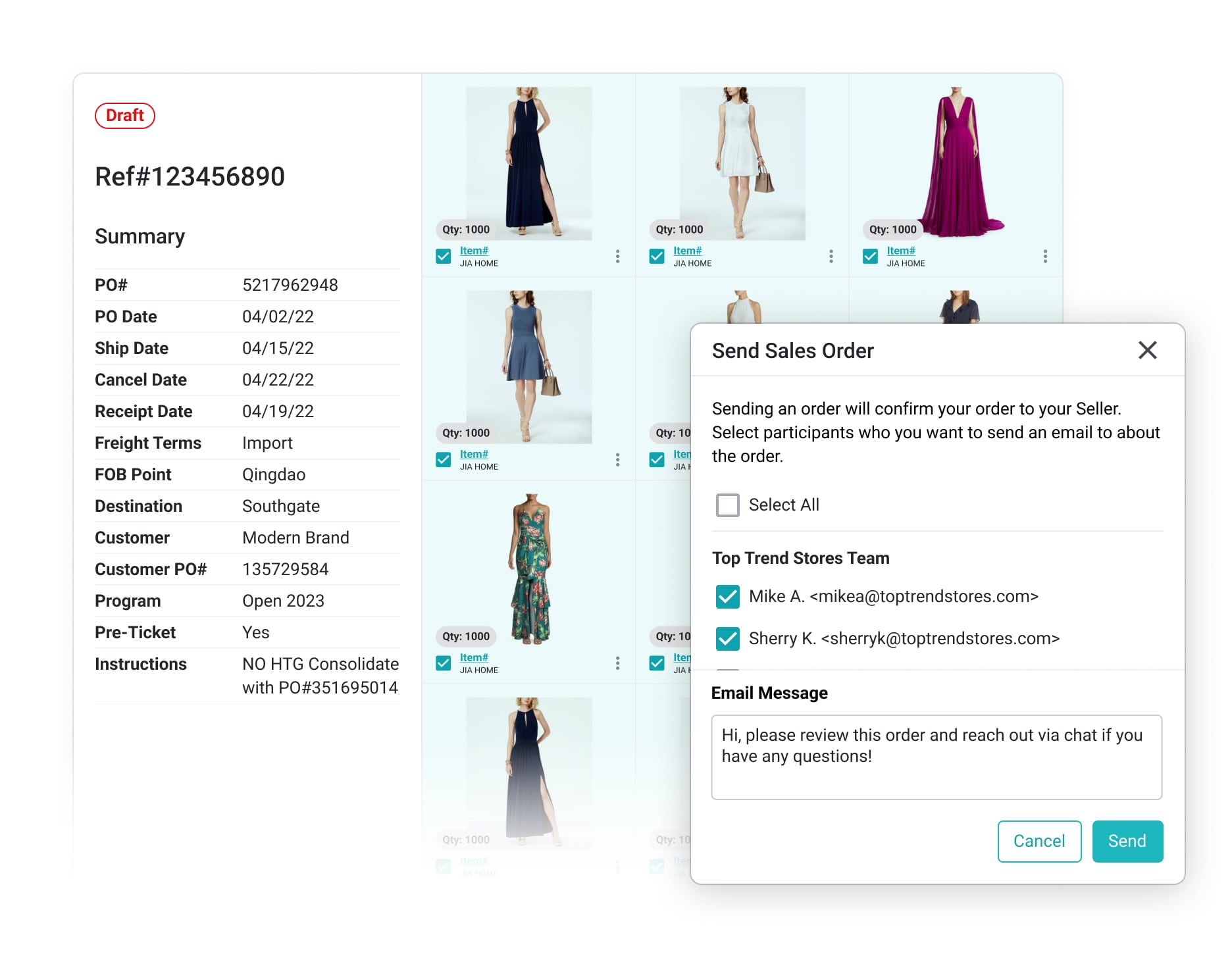Event Logs + Audit Trail Software
Turn Tedious Audits into an Intuitive Process
Surefront audit logging software features change logs that make SOX compliance a breeze.
Retail SOX compliance isn’t rocket science, but it sure can feel that way when you’re in a pinch. Meeting compliance requirements shouldn't require your team to spend weeks, or even months, away from their daily workflow. Digital audit logs simplify the process of communication compliance.
With Surefront audit trail software, the finance team will be able to digitize your audit logging process. Sensitive data will be protected and stored within one singular operating system.
Get ready to tackle complex SOX audits in a fraction of the time. No more panic. No more chaos. Just a better way to achieve retail SOX adherence over the long haul.
Complete SOX-compliant audits in a fraction of the time with automated audit logging.
Look back to
move forward
Review what went right and what went wrong, learn from experience, then come out the other side a leaner and meaner machine.
Surefront allows retailers to audit both current & past projects, including the teams involved in each process.
Review data quickly and seamlessly. Get to market flawlessly, in record time.

Track 100% of changes to key product, quote, and order data for full accountability.
Everything is clear
Thank automated data entry, object-oriented historical data, and built-in data transparency tools for this unique capability.
Surefront efficiently and effectively eliminates mistakes on quotes/orders, so brand or retail teams can move more easily through the buying process.
Use Surefront to save and retrieve order data, reference historical quotes, or adjust and customize formatting.

Cut incident resolution times by up to 80% by enabling quick issue diagnosis.
All in one place
Imagine having all buyers, quotes, products, historical orders – everything – all in a single system.
Communicate and collaborate with everyone on the team, including internal and external players.
When the right information is at your fingertips, it’s easy to build and send quotes. Staying organized has never been this easy.

See how audit trails can power 80% faster issue resolution.


FAQs
Retail audit trail accounting software tracks and records the activities, transactions, and changes made when operating a retail business. Audit logging captures and stores a sequential record of events. It also maintains audit trails of users, actions, system activities, and data modifications.
Audit trail records are able to enhance transparency, accountability, and security within your retail operation. More specifically, audit trails help retailers with:
-
Activity tracking
An audit trail system provides meticulous record keeping by monitoring and recording activities within a retail operation. This includes: user logins, data modifications, inventory adjustments, transactions, any discounts applied, price changes, and other activities. It tracks which users performed an action, what action was taken, when it occurred, and any associated details.
-
Data reliability and regulation adherence
Audit trail tools ensure the integrity of retail data, and confirm that your organization adheres to compliance standards. By maintaining audit trails, audit logs capture all changes and modifications made within an organization.
This helps meet requirements, ensuring that a retailer adheres to industry regulations, company policy, and auditing requirements. The audit trail acts as an indisputable record, arming retailers with evidence of data reliability and accountability over time.
-
Security breaches and fraud detection
Audit logs help maintain information security by identifying breaches, unauthorized access, or potential fraudulent activities. By tracking user activity, it helps identify any anomalies or security breaches that could indicate fraud within a retail operation. This helps prevent and mitigate risks for fraud incidents.
-
Investigation and dispute resolution
In the event of discrepancies, errors, or disputes, retailers depend on the meticulous record keeping of audit trails. Audit logs serve up a detailed record of all activities for easy investigation and dispute resolution.
Retailers can utilize audit logs to trace the sequence of actions leading to a particular event or discrepancy. This facilitates efficient issue resolution and minimizes potential financial/operational impact to the business.
-
Audits
This type of tool supports internal and external regulatory audits by providing comprehensive and reliable audit trails. It lets auditors review all activities and changes made within their retail operation, which ensures adherence to regulatory requirements, internal controls, and adherence to industry standards.
-
Reporting and analysis
Audit log software usually includes reporting and analysis capabilities. This allows retailers to generate insights and extract meaningful information from audit trail data. Form there, reports can be generated to analyze user behavior, identify trends, detect anomalies, pull up specific historical data, and assess system performance.
This is how audit trails help optimize business activities, improve security measures, and enhance efficiency.
Overall, audit systems for retail provide a comprehensive and detailed record of activities, business transactions, and changes. They promote transparency, information security, and regulation adherence, while also facilitating investigations and painless audits.
An audit trail can help retailers enhance operational control and risk management, while maintaining the trust of retail customers, stakeholders, and regulatory enforcers.
Audit logs help retailers ensure they're compliant with regulations and internal policies in a few different ways:
-
Comprehensive tracking
Use audit logging to capture and record relevant activities, transactions, and changes within your retail organization. This includes employee activity, system activity, data updates, and more. Providing a comprehensive record will help you demonstrate adherence to external auditors.
-
Tamper-proof documentation
Audit logs give you a tamper-proof documentation of business activities that you can refer to when in a pinch. You'll find details like historical record access by user, who performed which action, when the action occurred, and any associated information.
This documentation is concrete evidence to support your compliance efforts during audits. It provides reliable records during external or internal investigations.
-
Regulatory alignment
Audit logging can be configured to align with specific retail industry regulations and standards. Your audit log ensures that all activities and data align with the required guidelines.
The system can enforce data retention policies, access controls, and data protection measures mandated by regulations such as GDPR (General Data Protection Regulation), or PCI DSS (Payment Card Industry Data Security Standard).
-
Proactive monitoring and alerting
The software may also have real-time monitoring capabilities to detect and flag potential regulatory issues in your business. It can generate alerts for suspicious or unauthorized user activity, so you can take immediate action.
This helps identify and address fraud or breaches promptly, minimizing the impact and mitigating risks.
-
Auditing and reporting
Reporting functionalities will allow you to maintain records and generate specific reports for different industries. The reports present a clear overview of your companies' activities, changes, and events. You can generate audit logs for internal audits, external audits, or a regulatory audit, all from one system.
The tools streamline the audit process by providing ready-to-use reports that ensure your compliance efforts have total data reliability.
-
Access controls and user accountability
Audit tools often integrate with user data access controls as part of their services. They help enforce user accountability by tracking each individual user id and activities. By associating actions with specific user accounts, you can monitor and control user behavior.
Thus ensuring that your employees adhere to internal policies and follow all authorized procedures, reducing the risk of non-compliance.
-
Documentation and workflow management
Audit log software often includes features for documenting and managing workflows. You can define and enforce standard operating procedures (SOPs) within the software. Thus ensuring compliance processes are consistently followed, as well as facilitating process standardization and traceability.
By leveraging software with audit log capabilities, you can establish and maintain an intuitive compliance management framework. Audit logs come equipped with tools to track, document, monitor, and report on activities.
This ensures your companies' adherence to regulations, preparing you for internal audits or external audits. By maintaining data integrity, protecting customer information, ensuring adherence, and mitigating risks, audit logs will help you build trust with customers and regulatory bodies, without losing weeks of work to do so.
Retail audit software usually offers users a range of features that are designed to capture, track, and monitor retail activities.
The software records and tracks various user and system activities, user logins, data modifications, transactions, inventory adjustments, discounts, and more. It captures details like the user responsible for a task, as well as the timestamp and specific actions performed.
These systems provide a sequence of events in chronological order. They capture a detailed log of actions and changes made to ensure data integrity and transparency.
They also capture and store audit trail data in a secure and centralized repository. So the data is tamper-proof and readily accessible for external audits. The storage might include features such as data encryption, backups, and version control.
Many of these solutions offer real-time monitoring capabilities, which monitor user activities and events, generating alerts for suspicious or unauthorized actions. Real-time monitoring helps your team proactively identify and resolve issues in real time.
Retail audit systems often include reporting and analytics, which help you generate customized reports based on your audit trail data. These reports provide insights into system activities, user behavior, trends, regulatory adherence status, and more. Analytics features may also include data visualization, trend analysis, and anomaly detection.
You can configure the tools to align with specific regulatory requirements and internal policies relevant to your retail niche. This helps ensure you are adhering to regulations such as GDPR, PCI DSS, HIPAA, and others.
Audit logs often integrate with user data access controls and authentication systems. They help enforce user accountability and ensure that only authorized personnel can access the system services. User access controls help prevent unauthorized access to protect sensitive data.
Retail audit systems typically include features for data retention and archiving. These allow you to define retention periods for audit trail data based on industry requirements. Archiving ensures that historical audit and internal fraud trail data is stored securely for your future auditing purposes.
Audit trail tools offer customization and configuration to adapt to specific retail workflows, or regulatory needs. They let you define audit trail parameters, capture specific data points, set up multiple audit trails, and configure alerting mechanisms based on your unique companies' requirements.
Keep in mind, the specific features of your audit trail software will vary depending on your software provider, as well as your specific needs and requirements. We suggest that you evaluate different solutions to find the one that best meets your financial transaction/audit trail management needs.
Short answer? Yes. Audit trails, and the systems that generate them can provide historical data for analysis. One key function of audit trail software is to capture and store a chronological sequence of events and activities.
Audit trail tools usually include features for data retention, allowing retailers and small businesses to define how long their unique audit trail data should be stored. Historical data is preserved based on defined retention periods.
These systems usually provide query and search functionalities that allow retailers to retrieve historical data based on specific criteria. Retailers use audits to search for events, actions, or changes within a specified time frame or related to specific users, products, or transactions.
Audit trails may include reporting and analytics capabilities to generate insights from historical data. Retailers can generate reports that analyze past activities, user behavior, trends, or regulatory status. Analytics features may also provide data visualizations, trend analysis, or anomaly detection based on historical audit trail data.
When issues arise, historical data captured by a complete audit trail can be essential for investigation purposes. Retailers can trace the sequence of actions leading to a particular event or issue to help analyze the root cause and resolve the issue. Historical data can also be used to home in on patterns of external fraud, identify responsible parties, or provide evidence during investigations.
Historical audit trail data is incredibly valuable during audits. The right tools help retailers keep financial records that provide several audit trails of past activities, changes, and user actions. Auditors can then review the historical data to ensure it fits with industry standards and best practices.
In some situations, historical audit trail data might be needed to meet legal or regulatory requirements during an external audit. In case of legal disputes or financial investigations, for instance, historical data from the software can be used as evidence to defend claims.
Historical data enables retailers to leverage past information for analysis, investigation, and legal purposes. It enhances transparency, supports decision-making processes, and ensures accountability. Consult with your specific software provider to understand the exact functionalities for accessing and utilizing your companies' unique historical audit trail data.
From Our Blog

Future Proofing MerchOps Workflows for the Next Era of Retail

Brands That Move Markets: Lessons from Retail Leaders
